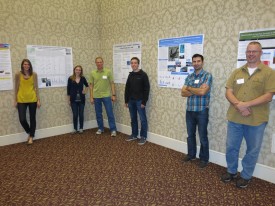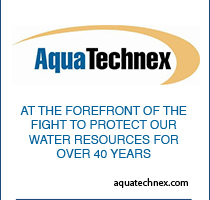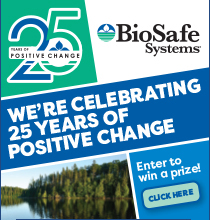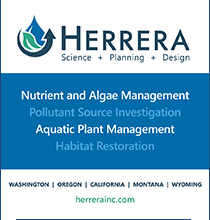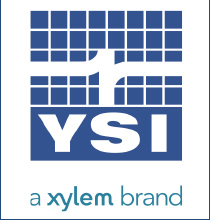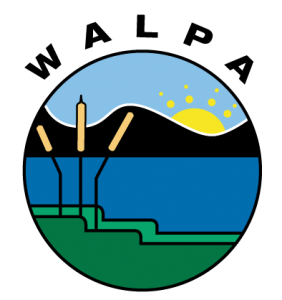 Lake managers, professionals and lakeside residents converged on beautiful Walla Walla for the 28th annual WALPA conference at the end of October. In total, more than 90 members attended to sharpen their lake management knowledge and network with other lake-minded people. This year’s theme of Looking Back to Prepare for the Future provided a great framework for evaluating our organization’s progress and setting us up for a successful future.
Lake managers, professionals and lakeside residents converged on beautiful Walla Walla for the 28th annual WALPA conference at the end of October. In total, more than 90 members attended to sharpen their lake management knowledge and network with other lake-minded people. This year’s theme of Looking Back to Prepare for the Future provided a great framework for evaluating our organization’s progress and setting us up for a successful future.
The conference kicked off with a plenary talk exploring the thirty years of WALPA history from 1986 – 2015. WALPA veterans Harry Gibbons, Rob Zisette, Gene Williams, Sally Abella, Bijay Adams, and Jim Gawel explored the successes, challenges, and future of WALPA. Major themes included the importance of lake funding in the state, the need to work with lake groups and citizens, and the significant progress that a small group can make. The milestones noted by the plenary speakers and more than 30 other past and current WALPA members will be available online for everyone at www.walpa.org under “About Us.”
Technical sessions started on Monday with two intensive training workshops attracting about 50 participants. Harry Gibbons and Shannon Brattebo of TetraTech, Inc. teamed up to give a phosphorus inactivation workshop about the ins and outs of alum treatments and similar techniques. Attendees wanting to enhance their plant and algae identification skills benefited from a hands-on presentation by Jenifer Parsons and Ben Peterson (plants), and Rachael Gravon and Karl Bruun (algae).
The second and third days of the conference were filled with topics including lake management, data analysis, lake pollution and toxics, and nutrient cycling. Highlights included the introduction of Washington State Department of Ecology’s new lake data website. Jenifer Parsons walked us through this “one-stop shop” for Ecology’s data on plant and water quality monitoring, grant funding history, and aquatic herbicide use for lakes around the state. Joan Hardy from the Washington Department of Health brought us up to speed on the latest in toxic algae research. She concluded her talk by introducing and asking for feedback on Ecology’s initial efforts to develop 303(d) narrative criteria for cyanotoxins for adoption in Washington’s Water Quality Criteria. While there were too many great talks and posters to describe, you can see the full set of abstracts, authors’ contact info and soon, PDF’s, at www.walpa.org.
Students from across Washington and Idaho had a big presence at this year’s conference throughout the talk and poster sessions. There was a tie for best student presentation. Sarah Burnet won for her talk on The need for multiple within-lake sites to determine rates of internal loading from sediment cores. Andrew Child took home both an award for the best student talk (Tracking long-distance atmospheric smelter waste deposition in remote lakes) and the graduate student poster prize for his work on sockeye salmon spawning in Lake Roberta. Corey King and Rebecca Rigg won the undergraduate student poster prize for their work developing a nutrient model for Waughop Lake. All of the students won big, though, with the success of the student scholarship fundraising auction (see related article).
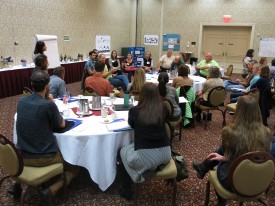
Conference attendees meet in smaller groups to discuss WALPA’s future direction at the visioning session.
One of the most exciting sessions was a WALPA “visioning session” where attendees met in smaller groups to discuss WALPA’s future direction, focusing on membership, legislative initiatives, and volunteer lake monitoring. Session participants discussed improving legislative communication and statewide lake funding, increasing membership, working to better include Idaho members, starting a statewide volunteer lake monitoring program, and hosting a citizen workshop for the western part of the state. The WALPA Board will use the ideas generated to direct our work for both the short- and long-term and will be looking for members to volunteer for these committees.
As always, the conference also provided the venue for our annual business meeting, including the presentation of the Secchi Disk Achievement Award. This year two long-time WALPA members were recognized for their outstanding contributions to the science, management, and protection of lakes. Sally Abella won for her extensive work on lakes in King County both during her years of research and as a lake specialist with King County. The second recipient, Maggie Bell-McKinnon, received the award for her tireless efforts to support and protect lakes at the Washington State Department of Ecology.
The business meeting also marked a farewell to Board members Chris Knutson (past-president), Frank Wilhelm, Karl Bruun, and Isabel Ragland. New Board members elected include Timothy Clark, Chhay Mam, Joan Hardy, Andrew Child, and Sandra Mead. Jeremy Jenkins will serve as the new President-Elect and will begin planning for next year’s conference soon. Amy Martin will also be transitioning onto the Board to replace Jeremy as Secretary.
Thank you to everyone for attending, as well as to the presenters, sponsors and all the WALPA Board who helped make this event a great success. If you couldn’t make it, read on to see what you missed and be sure to check out www.walpa.org for a listing of the session abstracts.


